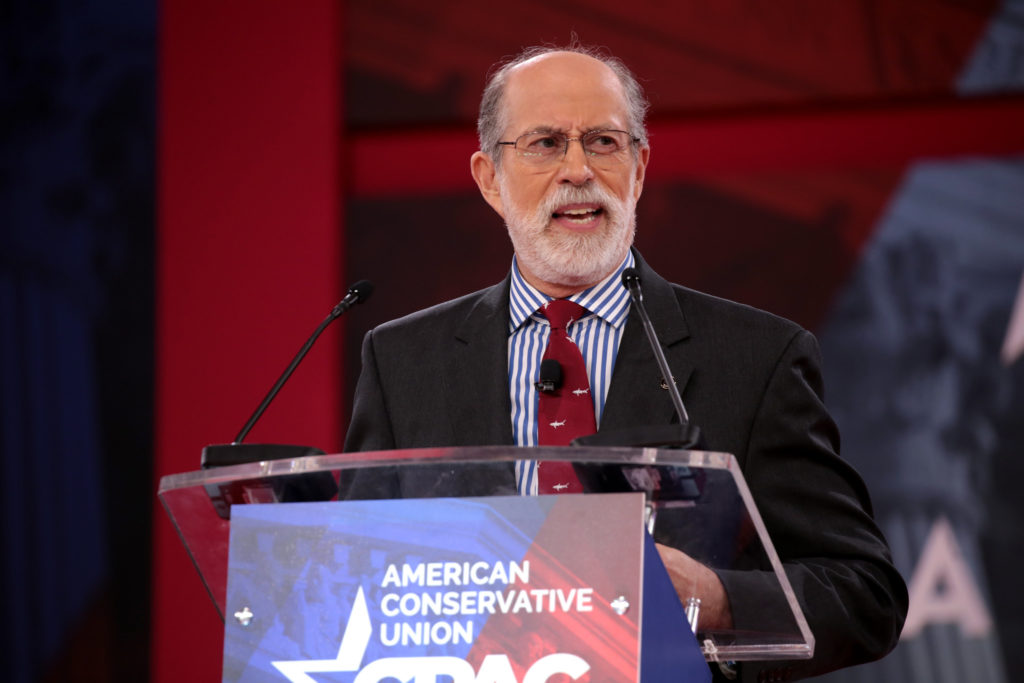What is “model legislation”?
“Model legislation” is statutory language typically drafted by special interest groups and handed out to friendly lawmakers to introduce state by state. It’s a tried-and-true political tool used to influence the nitty-gritty details of policymaking in statehouses across the country, often without much scrutiny or attention.
The tactic has been adopted by a wide range of special interest groups — such as the American Legislative Exchange Council, a conservative, pro-business group that has developed model legislation by the hundreds since its founding in the 1970s.
By handing out pre-written legislation, special interest groups can help shape the agenda, particularly in part-time, “citizen legislatures” whose members often lack the time and resources to develop legislation on their own.
The use of copy-and-paste legislation — on topics as varied as asbestos liability and used car sales — is the subject of an investigation by USA TODAY, the Center for Public Integrity and The Arizona Republic.
USA TODAY and the Republic found at least 10,000 bills almost entirely copied from model legislation were introduced nationwide in the past eight years, and more than 2,100 of those bills were signed into law. In a separate analysis, the Center for Public Integrity identified tens of thousands of bills with identical phrases, then traced the origins of that language in dozens of those bills across the country.
For the first time, the investigation reveals how effective efforts behind the American Laws for American Courts model bill have been and how those groups have branched out to include Andy’s Law and other copycat bills that critics view as Islamophobic, keeping their issues on the agenda in statehouses across the country.
‘An organizing tool for hate groups’
In early 2016, Idaho lawmakers were invited to a discussion of refugee resettlement by “concerned Idaho citizens.” An email described the meeting, in the Capitol building’s Lincoln Auditorium, as a “very important presentation on refugee resettlement,” according to a Washington state newspaper report at the time.
The meeting wasn’t about helping refugees. It was about warning that they posed a threat to the state.
The event featured Christopher Holton, vice president of outreach for the Center for Security Policy.
A prolific blogger on fringe right-wing websites, Holton has labeled Muslim-American advocacy groups “Muslim Brotherhood organizations” and compared them to American Nazi -sympathizers of the 1930s.
A post on Christopher Holton’s Facebook page. Holton serves a key role in the spread of model legislation backed by the Center for Security Policy: He connects his organization with like-minded lawmakers.
At the Idaho meeting, Holton talked about “the threat from Jihad,” adding a warning that refugees being resettled in Idaho were cause for concern, according to news accounts.
Holton’s rhetoric caught the attention of then-Idaho Rep. Redman, a Republican. Two months later, he introduced a bill copied from the Center for Security Policy’s American Laws for American Courts model legislation.
The brainchild of New York attorney David Yerushalmi, general counsel for the Center for Security Policy, the model bill states that judges’ rulings are void if based on foreign laws that violate rights guaranteed by the U.S. Constitution or state laws.
American Laws for American Courts never mentions Islam — a fact often repeated by backers — but its supporters invoke Sharia in arguing why the legislation is needed. At the capitol in Boise, Redman circulated a handout that included a picture of a severed hand and a man kneeling to be beheaded, offered as portrayals of the threat Sharia poses to Western society.
For Muslims, Sharia governs how to pray, treat family members and handle financial affairs. In some parts of the world, it’s enforced as draconian law; for countless other Muslims, it is simply a code of conduct.
Gaffney didn’t respond to repeated requests for comment for this article. But he and others at the Center for Security Policy claim in the book “Shariah: The Threat to America” that the U.S. has been “deeply influenced by an enemy within that is openly determined to replace the U.S. Constitution with shariah.”
To push the bill, Redman solicited support from the local chapter of ACT, which describes itself as a “national security grassroots advocacy organization.” In an email Redman told the group: “I have already received emails asking why I am wasting our governments time on it. Now is the time for your group to go to work on your known legislators.”
The leaders of ACT’s Idaho chapter, Tom Howie and Warren Grover, told Redman in an email: “We are experiencing an increasing number of refugees in our state through the Refugee Resettlement Program and our potential for more problems increases almost daily. It is time for the state legislature to take steps to pass legislation to protect the citizens of Idaho from potential acts of terrorism and from being subjected to any foreign laws.”
Repeating a pattern seen in other states where copies of American Laws for American Courts were introduced, ACT encouraged members through emails and social media to attend legislative hearings and flood lawmakers’ inboxes and phone lines to voice vsupport for the bills.
And they did. Over the next few months, members of the ACT chapter claimed to collect at least 170 petition signatures in support of the bill. They also emailed and called lawmakers.
What’s happening in your state?
Subscribe to our weekly newsletter to stay in touch.
They targeted state Sen. Bart Davis, the Republican Idaho Senate majority leader at the time, whom they believed opposed the bill. ACT leaders accused Davis of “selling out the safety of Idahoans to the (United Nations)” and instructed followers to “let him have it” in a Facebook posting with his email and office phone.
ACT trumpets the passage of the copycat legislation it supports on a portion of its website titled “State Wins,” and has led widely publicized marches against Sharia law. When Andy’s Law passed in North Carolina, ACT posted a celebratory message on its official Facebook account, calling for members to get involved in the organization. “In just 7 years, ACT for America has been responsible for the passage of 42 bills in over 20 states!” the post said.
Civil –rights groups say the combined efforts of the Center for Security Policy and ACT have made the anti-Sharia bill the country’s most widespread example of hate-driven copycat legislation.
The copycat legislation started to gain traction in 2010, coinciding with the rise of the “birther” movement, which falsely alleged President Barack Obama wasn’t born in the United States. The groups seized on conspiracy theories claiming Obama was secretly Muslim to launch their legislation, according to Khaled Beydoun, an associate professor at the University of Detroit Mercy School of Law who has studied the movement.
“It came at an opportune time with the emergence of the Tea Party,” he said. “There was a lot of hysteria around the conspiracy that President Obama could be an undercover Muslim.”
“It came at an opportune time with the emergence of the Tea Party. There was a lot of hysteria around the conspiracy that President Obama could be an undercover Muslim.”
Khaled Beydoun, associate professor at the University of Detroit Mercy School of Law Since 2010, some version of the model bill has been debated in 43 states and signed into law in at least 12, according to the Southern Poverty Law Center tracking of the legislation. USA TODAY and The Arizona Republic’s investigation, which used a computer algorithm to detect similarities in language, found during that period nearly identical copies of American Laws for American Courts had been introduced 40 times in 17 states.
Heidi Beirich, director of the Southern Poverty Law Center’s Intelligence Project, said the copycat bill is intended “to draw attention to their anti-Muslim beliefs.” SThe center has tracked the spread of the legislation, including through public records requests it shared with USA TODAY and the Center for Public Integrity.
Maya Berry, executive director of the Arab American Institute in Washington, D.C., which advocates for Arab people of all faiths, said the copycat legislation isn’t intended to fix any real problem. “It’s an organizing tool for hate groups,” she said.
Supporters of the legislation can cite few instances where Sharia factored into court rulings, and those that violated American laws were overturned on appeal.
Representatives of ACT did not respond to requests for comment. The group’s website says it does not “tolerate any bias, discrimination, or violence against anyone, based on their religion, gender, race, or political persuasion.”
Yerushalmi, author of the American Laws for American Courts model legislation, told USA TODAY that liberal groups and the media have misrepresented it as anti-Islamic when it’s “absolutely religiously neutral and it’s intended to be so.”
But, Yerushalmi acknowledged, he grew concerned after seeing Sharia play a role in U.S. court cases. “Islamic law is massively unconstitutional in the context of American laws and American courts,” he said.
‘An industry that is well-funded and organized’
American Laws for American Courts has not only been a legislative success for the groups that support it. It has also been useful for fundraising.
The Center for American Progress, a left-leaning think tank, tracked the money behind groups that make up what it dubbed “the Islamophobia network,” a web of “organizations, scholars, pundits, and activists” that spreads an anti-Muslim ideology. The think tank identified tens of millions of dollars donated to advance these ideas, including $7 million that went to the Center for Security Policy between 2001 and 2012.
In fundraising emails, ACT trumpets its success persuading lawmakers to sponsor copycat bills. A 2017 email from ACT’s national leadership solicited donations by mentioning the group’s designation as a “hate group” by the Southern Poverty Law Center.
The Center for Security Policy asks for donations on its website as it evokes concerns about terrorism and American sovereignty. “Jihad has come to our shores,” it warns, asking supporters to “help the Center continue its vital work to help keep America safe and secure.”
Internal Revenue Service filings show the Center for Security Policy raised $6.5 million in 2017, and Gaffney’s annual compensation exceeded $355,000.
Nationwide, groups “whose primary purpose is to promote prejudice against, or hatred of, Islam and Muslims” took in about $206 million between 2008 and 2013, according to a report from the Council on American-Islamic Relations and the University of California-Berkeley’s Center for Race and Gender.
“They are immensely rewarded for promoting their hateful bigotry of Muslims and Islam,” said McCaw of the Council on American-Islamic Relations.
Berry, with the Arab American Institute, said after nearly a decade tracking the spread of legislation backed by the far-right network it’s clear, “it doesn’t happen in a vacuum. We have to think about an industry that is well-funded and organized.”
Andy’s Law: Following the playbook
The anti-Sharia bill failed in Idaho in 2016. Redman, who declined to comment for this story, unsuccessfully reintroduced it in the next two legislative sessions. He decided not to seek reelection and left office in December.
But by the time Redman took up the American Laws for American Courts copycat bill, it had been introduced in nearly every state and was losing the momentum it enjoyed while the ‘birther’ movement was in full swing.
The Center for Security Policy was already recruiting lawmakers to push another piece of copycat legislation.
At a conservative legislative conference in 2015, Holton, the right-wing blogger who conducts outreach for the Center for Security Policy, approached Rep. Hill, a Florida Republican.
In recounting that conversation, which took place at an American Legislative Exchange Council meeting, Hill said Holton indicated the cut-and-paste legislation had been presented in other states. Known as Andy’s Law, the measure allows families of the victims of terrorism to sue those who provided material support to terrorists, not merely the perpetrators.
“Would you be interested in doing that in Florida?” Holton asked.
“Absolutely,” Hill replied.
Hill’s political position aligned well.
“PRO LIFE PRO GUN PRO JESUS,” reads a campaign ad on Hill’s Facebook page. The words are set over a picture of military jets screaming past a white cross, adjacent to a photograph of Hill and President Donald Trump, side-by-side, flashing a thumbs-up.
A campaign ad on Mike Hill’s Facebook page. When Holton handed the bill language to Hill, it was merely the latest step toward bringing the “Andy’s Law” idea to reality.
U.S. Army Pvt. William Andrew “Andy” Long, was killed in 2009 outside a military recruiting center in Little Rock, Arkansas, by a shooter who had been radicalized by U.S. wars in the Middle East. After Long’s death, Arkansas lawmakers, national security activists and Daris Long, Andy’s father, drafted the legislation.
Daris Long said he was frustrated with the Obama administration’s response to the attack and supported the Arkansas measure and efforts to get it passed across the country.
“I have more faith in the states,” he told the Center for Public Integrity. “I don’t have faith in the federal government.”
Stephen Gelé, a New Orleans attorney who helped write the original draft of Andy’s Law, said the measure doesn’t target Muslims or other specific groups. Rather it closes a loophole in federal law that requires there be an international link to the crime in order to prosecute it as terrorism, he said.
“People have disagreements about policy. People have disagreements about motivation. But I think that it’s just wrong to say that Andy’s Law does not add anything that’s not already in law,” said Gelé, who advises lawmakers on the legal theory behind the bill and said his law firm, Smith & Fawer LLC, also works on it.
The international loophole indeed exists, according to Jason Blazakis, director of the Center on Terrorism, Extremism and Counterterrorism at the Middlebury Institute of International Studies. But Blazakis disagrees with the bill’s approach: Terrorist organizations are designated and prosecuted at the federal level, and he believes those responsibilities should not be ceded to the states.
“My concern is that the next step states could take is that they take it upon themselves to start designating groups [as terrorists] the federal government hasn’t,” Blazakis said in an email.
“My concern is that the next step states could take is that they take it upon themselves to start designating groups [as terrorists] the federal government hasn’t.”
Jason Blazakis, director of the Center on Terrorism, Extremism and Counterterrorism at the Middlebury Institute of International Studies Democratic Rep. Mary Lou Marzian, who voted against the version of Andy’s Law that passed in Kentucky in 2018, had other concerns about the bill. She worried conservatives pushed it simply to “be all fabulous about being tough on crime” but that it could be weaponized against Black Lives Matter protesters, an issue Marzian, who is white, recalled being raised by her African American colleagues.
Some Andy’s Law backers hoped the law would be used against Antifa, a left-wing, anti-fascist group that’s become more active since Trump’s election. Bill Ketron, a politician behind Tennessee’s version of the law suggested it could be invoked to target the group’s funders due to the murder of Heather Heyer at the 2017 Unite the Right white supremacist rally in Charlottesville, Virginia. Heyer, however, was killed by a neo-Nazi who rammed his car into a crowd, not a member of Antifa.
Hate-group watchdogs have been more blunt about the purpose of the copycat legislation. “Andy’s Law is about pushing a false narrative about American Muslims that creates fear about their houses of worship and community centers,” McCaw said.
Additionally, the bill’s proponents and detractors alike agree that Andy’s Law has never been put to use. Opponents of the legislation say texisting law already allows people to sue terrorists and their accomplices.
The groups behind the copycat bill stayed intensely involved after Hill took up the measure.
Hill’s legislative assistant sent Gelé proposed language for an amendment, asking for his approval before filing the bill. “Please confirm that this is the best language and I’ll ask staff to draft up our amendment,” the assistant wrote.
In June 2016, Hill’s assistant emailed Holton, Gelé and others: “GREAT NEWS!!! Rep. Hill participates in the American Legislative Exchange Council, where members can provide model legislation for the rest of the country to offer in their respective state legislatures. Turns out, they LOVE Andy’s Law and would like to use it for model language.”
ALEC representatives did not respond to requests for comment about whether they took up the bill. The agenda from ALEC’s 2016 annual meeting shows the organization discussed Andy’s Law, although it is not among the copy-and-paste legislation featured on its website.
In Florida, Center for Security Policy staff traveled to the Capitol for committee meetings and to testify on its behalf, if needed, according to Hill.
But the bill stalled, and Hill lost a state Senate bid and was out of office.
Undeterred, Hill and Holton sought the help of Republicans Rep. Jason Fischer and Sen. David Simmons to sponsor the bill in the next session. Emails show that throughout the legislative process, Holton and Gelé worked with the Florida lawmakers and their aides, editing or providing input for amendments, news releases and lawmakers’ testimony.
ACT encouraged its local chapters to flood legislators with messages in support of Andy’s Law. A post on ACT’s main Facebook page urged members to call and email Florida’s House leadership to demand a vote on the bill.
The bill passed, and Republican Gov. Rick Scott signed it in June 2017. Neither Simmons nor Fischer responded to requests for comment.
The groups used a similar playbook to push Andy’s Law in other states, interviews and legislators’ emails reveal.
Holton found other sponsors from the religious right like Hill, who said his faith as an evangelical, born-again Christian guides his votes.
Republican Sen. Jason Rapert sponsored Andy’s Law in Arkansas, for example, one of the states where the bill originated. A pastor, Rapert sent an appeal in November for other lawmakers to join him in building a coalition of Christian lawmakers.
On his official Facebook account, Rapert wrote about related issues. “Countries with Muslim leaders in control persecute Christians. Why do we want them having increasing political power in America?” he wrote in December.
Legislators, including some sponsors, from multiple states acknowledged they didn’t know where the text originated.
Rep. Susan Westrom, a Democrat who voted against the Kentucky version, said she believed a large number of what she called “baby legislators” voted the way Republican leadership ordered them to.
Republicans have proven more likely to fall in line behind the bills. But Democrats haven’t pushed back.
In the seven states that passed the bill, about 87% of Democrats voted for it, and about 7 % voted “no.” While 97% of Republicans voted for the bills, the remainder either abstained or were absent, with zero voting “no.” More than 80% of the sponsors in these states were Republican, including every primary sponsor.
Responding to the legislation
Muslim advocates say the rhetoric that follows these copycat bills has done tangible harm to Muslim communities.
Hate crimes targeting Muslims are at their highest levels since immediately after the 9/11 terrorist attacks, according to FBI statistics. In 2016, at least 381 anti-Muslim offenses were reported to law enforcement agencies.
Ahmed and Dalia Abdelnaby attend the Interfaith Sack Lunch Conversation event at the Islamic Center of Boise on Wednesday February 27th, 2019. Ahmed and Dalia have been vocal opponents of the so-called Anti-Sharia law bills. Those concerns were on Ahmed Abdelnaby’s mind in February 2018, as he sat in an Idaho House of Representatives’ Committee on State Affairs meeting to protest the state’s anti-Sharia bill.
An Egyptian immigrant, Abdelnaby settled in Idaho with his wife, Dalia Elgamel, in 2009 so they could pursue doctoral degrees in engineering at the University of Idaho.
Since that time, Abdelnaby had witnessed growing hostility toward Muslims in the state. There were repeated attacks on a mosque in Twin Falls, Idaho, where in 2017 a cross draped in pig guts, feet and a tongue was left outside the mosque.
Neither parent can forget the night their eldest told them another student had tried to fight him at school. He had spoken out in class after a teacher incorrectly claimed that Muslims support waging violent “jihad.” The other student took it as an invitation to start a brawl outside the classroom.
So Elgamel signed her husband up to speak at the committee meeting. Left unchallenged, she said, bills like the one in Idaho would help hate grow. “Those kinds of things will build a monster,” she said. “We need to be smarter than that with our kids.”
At the committee hearing, opponents of the bill filled the room, including a rabbi and Christian ministers.
Abdelnaby, initially hesitant, decided to speak.
“What I’m seeing is there’s lots of stereotypes against Sharia law, which have no facts,” Abdelnaby told the lawmakers. “Of course, we are all under the understanding that if my religion would ask me to do something against the Constitution, I would not do it.”




Join the conversation
Show Comments
Within the opening remarks of this article I asked myself “is there any way for the consumer to know if there is a recall on their vehicle on their own?” Not wanting myself to be in a situation where I could have protected myself from severe harm or death. The answer is yes – all you need to do is go to safercar.gov and type in the VIN number to see what, if any, recalls are on a specific car. Consumers can, quite easily, protect themselves without relying on the dealers ethics. This should have been mentioned in the article.… Read more »